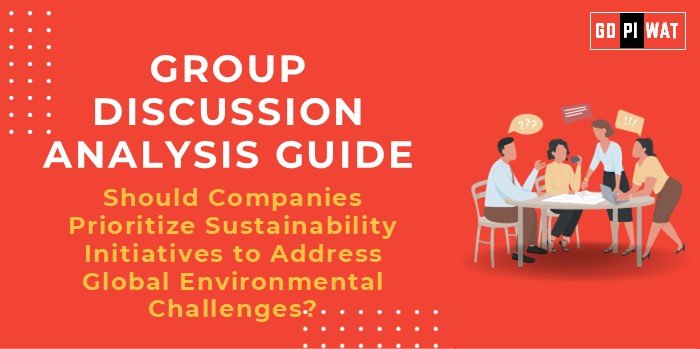📋 Group Discussion Analysis Guide: Should Companies Prioritize Sustainability Initiatives to Address Global Environmental Challenges?
🌐 Introduction to the Topic
- 📜 Opening Context: “As global environmental challenges escalate—ranging from climate change to resource depletion—companies face increasing scrutiny over their role in sustainability. Prioritizing sustainability initiatives is no longer optional but a strategic necessity.”
- 🌍 Topic Background: Environmental challenges have reached critical levels, with businesses contributing significantly to carbon emissions, pollution, and resource exploitation. International frameworks like the UN Sustainable Development Goals (SDGs) and global accords such as the Paris Agreement call for corporate responsibility.
📊 Quick Facts and Key Statistics
- 🌍 Global Emissions: Corporates contribute approximately 71% of global greenhouse gas emissions (CDP Report).
- 💰 ESG Investments: Sustainable investments grew to $35 trillion in 2023, representing 36% of global AUM.
- 🛒 Consumer Trends: 70% of global consumers prefer eco-friendly brands.
- 📋 Regulatory Push: Over 70 countries now mandate environmental reporting for businesses.
🤝 Stakeholders and Their Roles
- 🏛️ Governments: Enforce environmental regulations and promote green policies (e.g., carbon taxes).
- 🏢 Corporations: Adopt sustainability initiatives and align operations with global environmental goals.
- 👩👩👧👦 Consumers: Drive demand for sustainable products and ethical business practices.
- 💼 Investors: Integrate ESG (Environmental, Social, and Governance) criteria into investment decisions.
- 🌐 NGOs and Global Organizations: Monitor and promote environmental compliance (e.g., WWF, UNEP).
🏆 Achievements and Challenges
✨ Achievements:
- 🌱 Corporate Pledges: Companies like Amazon and Google target net-zero carbon emissions by 2040.
- 🔋 Renewable Energy Shift: Over 30% of global energy consumption comes from renewables.
- 🚮 Waste Reduction: Companies like Unilever have achieved plastic neutrality in several markets.
- 📄 ESG Compliance: Increasing transparency through sustainability reports.
⚠️ Challenges:
- 💸 High Transition Costs: Shifting to sustainable processes can be costly for smaller companies.
- 🟢 Greenwashing: Misleading environmental claims tarnish genuine efforts.
- 🌍 Global Inequality: Developing economies struggle with balancing growth and sustainability.
- 📦 Supply Chain Complexities: Ensuring sustainability across global supply chains.
🌍 Global Comparisons:
- 🇸🇪 Scandinavian Companies: Leaders in circular economy models (e.g., IKEA’s sustainable sourcing).
- 🇨🇳 China: Significant investments in green infrastructure while still grappling with industrial emissions.
📚 Case Studies:
- 🌟 Patagonia: Demonstrates how aligning profit with purpose can drive growth.
- 🚗 Tesla: Revolutionized sustainable transportation through electric vehicles.
🗣️ Structured Arguments for Discussion
- 💪 Supporting Stance: “Companies must prioritize sustainability initiatives as it enhances brand reputation, ensures regulatory compliance, and creates long-term value.”
- ⚖️ Opposing Stance: “Sustainability efforts can hurt profitability, especially for small businesses that cannot bear the costs.”
- ⚖️ Balanced Perspective: “While sustainability initiatives come with costs, the long-term benefits—economic, social, and environmental—far outweigh short-term trade-offs.”
💡 Effective Discussion Approaches
- 📜 Opening Approaches:
- 📊 Statistical Impact: “Corporations account for 71% of emissions, making their role in environmental solutions crucial.”
- 📖 Case Study Opening: “Patagonia’s sustainable business model proves that companies can thrive while being environmentally responsible.”
- 🔄 Counter-Argument Handling:
- “While initial costs are high, green practices often improve operational efficiency and reduce long-term costs.”
📈 Strategic Analysis of Strengths and Weaknesses
- 🏅 Strengths: Enhances brand image and customer loyalty; reduces regulatory risks.
- ⚠️ Weaknesses: High costs and slow ROI; risk of greenwashing.
- 💡 Opportunities: Innovation in green technologies; access to ESG-driven capital.
- ⚡ Threats: Competitive disadvantage for non-sustainable companies; strict global regulations.
🎓 Connecting with B-School Applications
- 📚 Real-World Applications: Sustainability can influence B-school projects on operations management, supply chain optimization, and corporate strategy.
- 💬 Sample Interview Questions:
- “How should companies balance profitability and environmental goals?”
- “What are the challenges of implementing ESG frameworks in emerging markets?”
- 🔑 Insights for B-School Students: Companies with strong sustainability initiatives tend to perform better in volatile markets; aligning sustainability with business goals fosters innovation.


